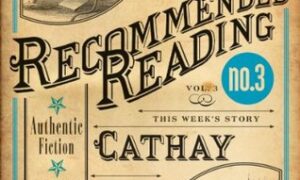 Look Past by Eric Devine
Look Past by Eric Devine
My rating: 3/5 cats



wow, that was fast—we went from having very few books about transgender teens available on the market to having a bunch all at once, and we’ve already reached the point where we can have a book with a trans protagonist where the main focus of the book is not on his trans status, but on the murder of a girl he once loved.
even more important is the fact that he’s pretty unlikeable. it’s a big “win” for representation when the “outsider” character is not some saint written to make bigots sympathetic, to show “they’re just like you!” but one who’s kind of an asshole. again, just like you!
it’s a similar development, on the gender identity/sexual orientation spectrum, to what happened way back in the olden days, when it was taboo to write openly gay male characters*—when they were all “confirmed bachelors,” and everything was handled through subtext and code and you’d have these caricatures of quippy uncles or well-dressed gentlemen. and then the world got more accepting and there were more and more openly gay characters, but they were supporting cast, benevolent, written with kid gloves. but now? now gay characters are just as villainous as straight folk:


it was a wonderful development when gay characters could be as flawed as any other human without fear of offense—this is true equality.
the kid in this book has a long way to go before he reaches villain status, but the book is impressive for presenting a trans male lead without making him stoically long-suffering in the face of his challenges, or even sympathetic.
because some teenagers, regardless of gender identity, sexual orientation, race, religion, whatever—some teenagers are just unpleasant.
it’s also impressive that this is a murder mystery instead of a story about avery’s transition. his identity plays into the situation in a major way, but this could have been written (although less dramatically) without avery being trans.
basic plot—avery is seventeen years old and has known he was a boy since the third grade. despite living in a small town with a very traditional-christian-values core, he’s doing all right—he’s been undergoing testosterone therapy since middle school, his parents and younger brother are supportive, he has a best friend and a girlfriend, as well as the memory of his brief romantic moment with mary, the reverend’s daughter; a moment he has never gotten over nor was able to repeat, since her father caught them and was most displeased. it’s not all rosy—he suffers douchey taunts from some of his classmates and many of the churchgoing folks, including mary’s father, find his transition sinful, but he’s got his people, and he’s getting by.
until mary turns up murdered and mutilated in the woods nearby and the killer is blaming avery for what they’ve done, and promising more violence if their demands are not met, demands which threaten avery’s entire identity.
if it sounds like a weird preoccupation for a murderer to have, it is, but this is less a realistic murder mystery and more an exploration of the philosophical quandary between conviction vs. sacrifice, weighing the demands of self against the safety of others, and personal freedoms threatened by terrorists. but, like The Picture of Dorian Gray‘s cheeky sexuality, that’s all subtext. it is absolutely a murder mystery, with resolution and everything.
but it’s a bit wobbly. the fact that it’s a mystery with this personal conflict wrapped around it means that some of the traditional mystery elements seem off. the killer’s demands, with a seemingly trivial “win” for them, but a deep psychological cost to avery, factors into this, the police are less competent than they should be, and avery and charlie (with half a semester of forensics class under their belts) are allowed more access than is typical in an investigation. it frequently reads less as a thriller and more like a problem novel, where a protagonist is at a crossroads and forced to make a difficult decision that goes against their own code.
and while you want to root for the hero, because that’s what books are for, and because it’s great to have trans literature out there for younger readers, avery doesn’t make it easy. because while it might be down to a testosterone imbalance that needs to be addressed, avery is wicked violent, and i don’t think readers would applaud some of his actions if the character wasn’t trans.
i understand being a teenager and lashing out, especially a teenager who’s had to fight a frequently hostile community for the right to be himself, and having a chip on his shoulder because of it. and that excuses some of avery’s actions:
commanding the police to remove a bigoted officer from his presence—which, yeah, officer wright is a dick who refused to use the correct pronouns and whose religion considers avery an abomination, but from his perspective, here are these kids compromising the crime scene where his reverend’s daughter was murdered, and avery is now making demands of the police, so it’s disrespectful on both sides, and even though you don’t want to make excuses for the bigoted zealot, avery’s imperious posturing is unappealing.
but worse than that is all the violence bubbling up in avery. not only does he drive aggressively and angrily, punching the steering wheel, scaring his girlfriend beth, but he has more troubling thoughts towards her:
My vision is reduced to a white-hot tunnel, and at the end is Beth. I want to hit her. I want to lash out in some way to hurt her as much as that statement hurt me.
even though her statement was more or less accurate.
and towards his mother:
in spite of how helpful she’s being, how much I know this hurts her, I want to hit her for how thrilled she sounded over her achievement with my hair.
and towards a female classmate, he is:
fully prepared to punch her in the face
the same classmate he actually did assault earlier:
…I feel an urge to hurt her. I shove her back, away from me. “Fuck you!” I scream.
and then he kicks the police officer (not the bigot) who tries to pull him off of her and continues to scream insults and call her a bitch.
he also punches a kid at school and head-butts a clerk at the verizon store, toppling him on his ass—His body thwacks with a density that makes me smile.
it just feels a little icky to root for a dude who’s fantasizing about hitting women, especially his mother. which, i suppose, opens a dialogue about all manner of gender and violence and behavior and nature and nurture and hormones and all of that, but for me—not a fan of avery.
but the book itself is mostly good—i liked the relationship between avery and his parents—the ease of his dad calling him “buddy,” (although avery is NOT a fan of his mom calling him “honey,” which elicits a scowl from him, despite his mom being comfortable with his transition and “honey” being a non gender-specific term of endearment from all mothers everywhere), and his thirteen-year-old brother is wonderfully wise:
“You’re you, and if people give you shit for that, that’s on them…Maybe I’m just used to things, but isn’t that kind of the point? Things are only weird if you don’t understand them. Really, if you don’t try.”
so, while i didn’t love-love the story, it’s definitely a step in the right direction—putting trans characters at the forefront and not making it all about the physical or psychological elements of transitioning. you don’t have to love a character to applaud a book.
* lesbian characters in literature had a different evolution because of pulp-noir and pornography and how all women have pillow fights that turn sexxy and that’s both titillating and just a phase, but two dudes is icky. sez history, not me.
read my book reviews on goodreads







